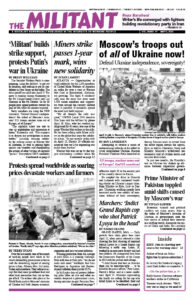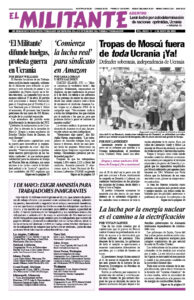Economic turmoil and political conflicts are rising across Asia in the wake of Moscow’s invasion of Ukraine, as governments seek the best course to defend their interests in a shifting world. Alongside the rulers of China and India, the capitalist leaders of Pakistan are calibrating the best place for themselves.
Pakistani Prime Minister Imran Khan was ousted April 10 after a vote of no confidence in parliament and replaced with former Prime Minister Shehbaz Sharif. Military chiefs dropped their support for Khan after his trip to Moscow on the eve of the Putin regime’s invasion, where he was caught on camera telling a Russian official, “What a time to come. So much excitement!”
The U.S. government congratulated Sharif on resuming office. It has long sought an alliance with the rulers of Pakistan. Since 2002 Washington has given the regime in Pakistan more than $14 billion in military aid. With support by U.S. special forces and drones, the Pakistani government waged deadly attacks on people in areas of the country controlled by the Taliban in 2009.
After Khan took office in 2018, he increased Islamabad’s allegiance with the Chinese government. He refused to host U.S. military bases and welcomed last year’s Taliban takeover in Afghanistan. In recent years Beijing has expanded its influence in Pakistan at the U.S. rulers’ expense.
Like numerous capitalist governments across the region, Pakistan’s has become more dependent on economic relations with Beijing. Since 2015 the Chinese government has invested $75 billion in roads, railways, energy production and pipelines linking China to the Pakistani port of Gwadar. Regular joint military exercises are carried out.
After his election Sharif told parliament, “We will make sure we make Pakistan a paradise for investment.” He focused on extending collaboration with Beijing on China’s Belt and Road Initiative.
After Khan was booted out, tens of thousands protested across the country. He began laying the groundwork for a political comeback with further rallies planned days after his ouster. Khan denounced the new government as “slaves to America,” alleging he was removed in a U.S.-led conspiracy.
Army spokesperson Maj. Gen. Babar Iftikhar denied Khan’s claims.
‘Everything is more expensive’
The impact of the deepening economic crisis on millions of workers and farmers during Khan’s time in office was used by his opponents to get rid of him, and makes his bid to return tough.
Double-digit inflation, including on essential food items, is pushing many toilers to the brink. The cost of fuel is soaring. “I voted for Imran Khan in 2018 but that was the biggest mistake of my life,” Hidayat Khan, a taxi driver in Islamabad, told the press. “In the last three years, everything has become more expensive.”
Khan’s “years in power have seen many poor people simply becoming unable to afford anything other than food,” nurse Zarina Bibi said.
Sharif immediately announced a series of social measures to appeal to working people, including an increase in the minimum wage and a plan to raise civil service pensions. He made no proposals on how to fund these.
International Monetary Fund officials put the agency’s loan program to Pakistan on hold in February, angered at Khan’s announcement of $1.5 billion in subsidies for fuel and electricity. Payments of $7 billion to wealthy bondholders on the government’s immense national debt are due later this year, but it doesn’t hold the cash reserves to make the payment.
Sharif’s government also cut electricity to households and industry, as it can no longer afford coal or gas to keep power plants running.
Pakistan is strategically located, with borders on Afghanistan, India and China. The military remains the key decision maker on policy there.

